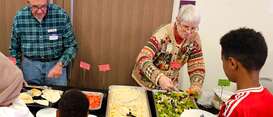
Stranded, scared, hopeless were some of the feelings that I was going through crossing the desert to Sudan. At ten-years-old, my family was fleeing our home country of Eritrea because of the harsh living conditions and mandatory military inscription.
In the border city of Teseney, we packed only the basics needed for survival and began our journey. We escaped with a group through the deserts of Sudan. It was summer and the temperature was unbearable. A dry heat enveloped us, like that feeling when you open your oven. My shoes were melting and I kept hallucinating that there was water just over each hill. After a whole day of continuous walking, we became separated from the others.

Our group left to get water like they had done many times before, but this time they didn’t come back. We sat, waiting, hoping for them to return. After two hours, we realized we had been left alone to die. My mother, younger brother and sister, and I had been abandoned in the middle of the desert with no food or water. We took shelter under a thin tree with a few leaves on its branches to be shielded from the scorching sun. My mom left us under the tree’s shade to look for help. She came back devastated that she hadn’t found food or water. As the sun set, we became consumed with many emotions knowing we were all going to die.
In Eritrea, the government used to show families who had tried to escape on the news, making an example of their deaths to discourage people from fleeing. We knew the journey would be dangerous, but we never thought this would happen to us. Now we would be another failed escape that the government would use to promote its agenda.
The sky turned a bright orange before it disappeared, leaving us under a moonless sky. Surrounded by darkness, things grew worse as we heard the high-pitched laughing of hyenas within striking distance. As I laid my back against a tree and looked out upon nothing but sand, I was sure this was the end. There was no light, no civilization, and most of all, no hope.
It had been two long days in the desert and my brother was starting to fade. My mother and I would try to wake him, but eventually he wasn’t responsive. He was dying. I felt miserable, as all I could do was watch him. As I started to give up, I saw a white fabric in the corner of my eye. I immediately yelled at the top of my lungs for help - it was a shepherd herding his sheep. He not only gave us food and water, but showed us the way to the refugee camp.
In total, we walked over 200 miles day and night. Now as I get ready to head to college over 7 years after that journey, I’ll never forget the difficulties we endured to get here.
Kudus Weldetensae is a senior at Emmett J. Conrad High School. He and his family were resettled from Eritrea by the IRC in Dallas in 2011. Kudus plans to study education in college.
